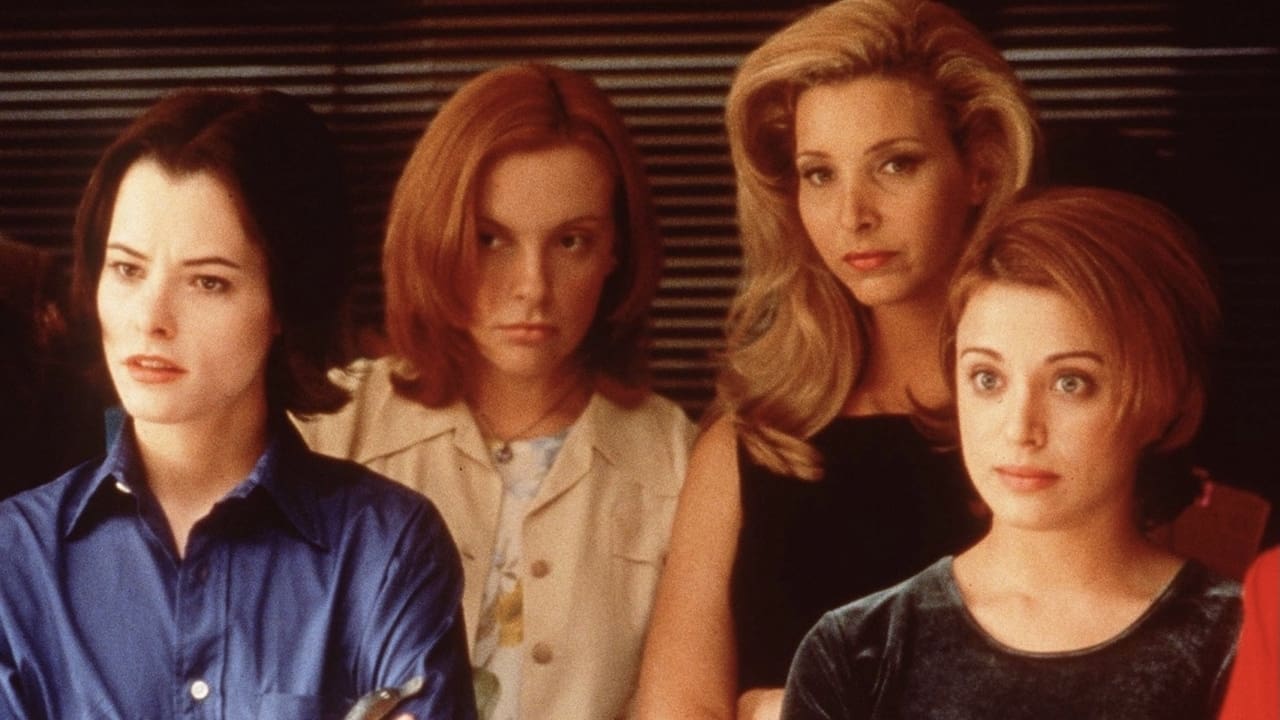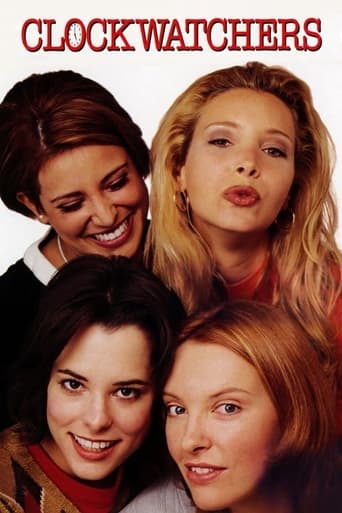

This movie allows you to look in on the challenges and small triumphs of four female office temps as they struggle to just get through the day. Yes, that doesn't sound very titillating BUT IT IS! I promise.Strong performances from the entire cast but Toni Collette and Parker Posey really shine.The strength of the film is how it somehow reveals the corporate world for what it is: completely de-humanizing. There are great scenes of comic satire and poignant moments anyone who has been on the lower rung of the business hierarchy will be able to recognize.Forget "Office Space" "Clockwatchers" is the definitive office world flick.
... View MoreClockwatchers is similar to my own perception of what it would be like to work at an office: sporadic moments of excitement in between periods where nothing really happens and occasionally boring. I do realize that the humor is supposed to be subtle. But it asks the question how far can a satire go before it stops being comedic and starts becoming an imitation of real life? Here. Brian Cox's character in Adaptation. said that something has to happen in a film in response to an innocent question from Charlie Kaufman. Something tells me he would have hated this film.I'm reluctant to say that Clockwatchers effectively captures what it's like to be a temp, mostly because I have never worked as a temp. But only a few minutes into the running length, it started to at least seem like someone had done their fair share of suffering as a temp in the past. Clockwatchers presents temps as the plankton of the office space food chain, people who are only noticed when they do something wrong. This point is driven home when Toni Collette's character Iris is told to wait for someone to give her instructions on her new job, and ends up waiting two hours. Finally, a woman comes, and she asks Iris why she didn't tell someone she had been waiting for two hours. This question is rhetorical to everyone but the oblivious woman. Even if she had, would anyone have had actually responded? The four characters are each an archetype of the office workspace that prove to be more complex as the film progresses (sort of like the Breakfast Club). In fact, one thing that I noticed about Clockwatchers is that the way it depicts office life is strikingly similar to high school. Iris eats her lunch in a bathroom stall in the hopes no one will discover her, the new temps are ignored, and everyone is quick to point fingers. Iris represents the new temp, while Margaret is the sardonic temp less than happy with her surroundings (and I also noticed: Margaret acts insulted when she is considered as the possible office supplies thief, yet early in the film she takes a set of shot glasses from a bar without much thought.), Lisa Kudrow plays an aspiring actress, and Jane is the meek worker.Also in Clockwatchers are the people around these four characters, all of whom seem weathered by the monotony of office life. They hoard their staples and rubber band balls as if they were priceless treasures, and only emerge from their cubicles to scold the temps and leave. Even something like disappearing office supplies is enough to have tongues wagging. If the four temps represent Molly Ringwald, Judd Nelson, and Emilio Estevez, the office workers represent the parents who desperately try to stay hip.In the end, Clockwatchers provides some interesting points, but it is nearly overshadowed by its flaws. Its most present one to me was the fact it's virtually plot less, and not in a good way at all. In addition to being boring, it provides another question: When the film is over, are the workers going to realize the waste office work is and stop ignoring the temps? Like the one question said early in the movie, the answer should be pretty obvious.
... View MoreInappropriately marketed as a comedy, Clockwatchers is actually a sad, almost disturbing slice-of-life concerning the empty lives of four office temps and the realistic and/or idealized ways they seek to escape their individual predicaments. This low-key, purposefully bland drama, with spare touches of humor from Margaret (Parker Posey), is steeped in realism, making it all the sadder. Margaret, Paula, and Jane befriend Iris, the central character, at her new temp job. Margaret is loud-mouthed, foul-mouthed, and smart. Paula (Lisa Kudrow) is a young woman with fast-fading beauty, loose morals, and no hope for a future. Jane (Alanna Ubach) is biding her time waiting for her man to marry her and take her away from the temp world. And Iris (Toni Collette) is intelligent but timid. Unlike her new friends, she has the opportunity to score a real job at an interview that her father has lined up for her; however, low self-esteem, shyness, and a new-found friendship with the office girls contribute to her procrastination. Outward, upward mobility seems to scare her. One day Iris stares blankly at her empty diary. Her temp job affects her so badly that she can find nothing to write about; she's been turned into a mindless zombie. During a moment of introspection, she thinks, `Sometimes it hits you, how quickly the present fades into the past. And you question everything around you. You wonder if anything you'd ever do would matter, or if you could just disappear without a trace.' Jill and Karen Sprecher's script is punctuated with perceptive, thought provoking lines, many of which comment on the individual's insignificance in society. Early in the film, Margaret comments on how `a person can just drift through life like they're not connected to anyone or anything.' Later, Iris admits that `even if a person wanted to break free, they could find out they've got nowhere else to go.' Ultimately, the Sprechers' four-character quasi-study can be applied to everyone, every day. Some characters move on, thus positively changing their lives forever; others, whether out of preference, procrastination, or lack of education, stay put, forever locked in dead-end jobs. At the film's end, Iris realizes that improving her situation can come only from `never hiding, never sitting silently, and never just waiting -- and waiting -- and watching the world go by.' Clockwatchers may be a `small' film with a soft voice, but at least it has something to say.
... View MoreThis is a really provocative movie that is artfully filmed.Good art often offers commentary on the times. When you're in the midst of an era, it's hard to see what characterizes it. I think Clockwatchers does a terrific job of capturing a facet of the temp world of the 80's/90's. I was a temp for a year in 1988. It's quite accurate.But you don't have to be a temp to recognize these characters. Yes Dilbert, yes Office Space, and especially the beginning of Joe vs the Volcano have these same foils. But I think Clockwatchers' take was unique. The characters were well developed while still being archetypes. There was a subtlety and style that all the others listed chose against.The direction and cinematography of this film is terrific. It takes guts to burn film doing a close-up of someone's glasses for 10 seconds. There is real art to this film. The writing, the directing, the pacing, editing, all right up at the top of the scale. The acting was fine, but I don't think it's the strong suit of this movie. Toni Collette is a standout. While I love Parker Posey, I think she was probably a bit over the top here. The Muzak, while as mood-setting as the buzz of florescent lighting, can grate at a viewer.This film touched on too may things to list them all. Here's a sample... What are you doing with your life if you're waiting for it to burn off? Isn't it exhausting and poisoning to pretend to look busy all day? If you are a cog in a machine, and accomplishing nothing at that too, did you really even exist? Are the "troublemakers" in life getting us in trouble, or offering us freedom (note there are two people here stirring up the pot)? What is theft (and theft of services)? Where is the dividing line between unethical play and immorality? At what point do you give up on the dream of personal growth? Are some people "better" than others? What does beauty (and grooming) have to do with it? Does the corporate hierarchy define our worth to others or our self-worth? What is loyalty and betrayal, to whom do you owe how much, and how do you give consent to those obligations/ownership? Work/friends/family are all portrayed as villains and allies wielding this loyalty Sword of Damocles.One IMDB reviewer said this film was a good way to kill time after work. That's terrific irony. :)
... View More